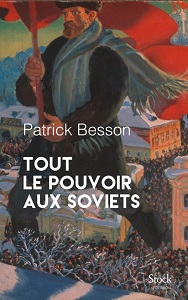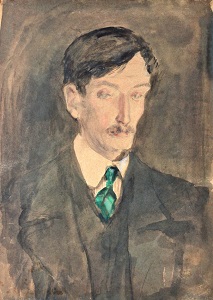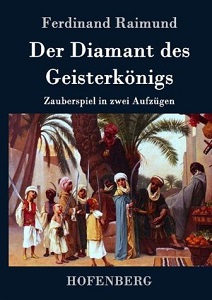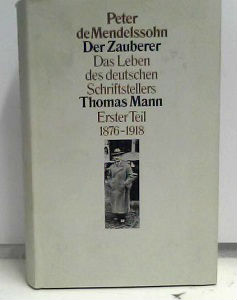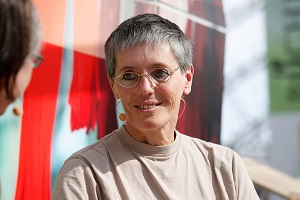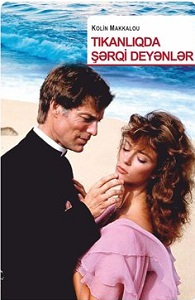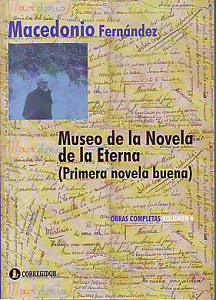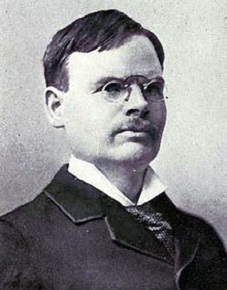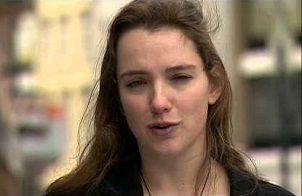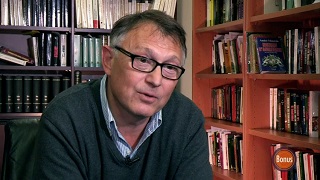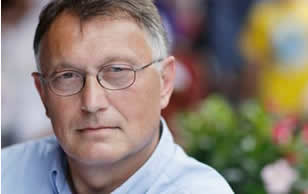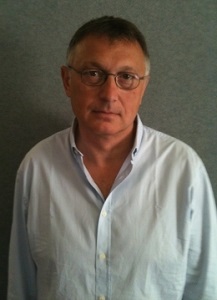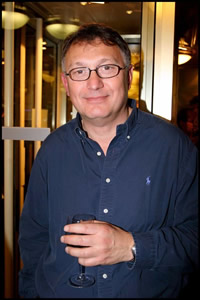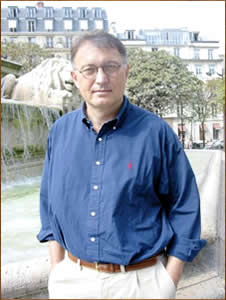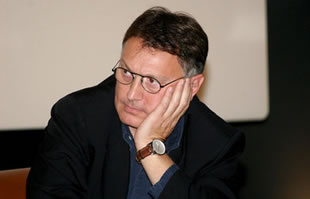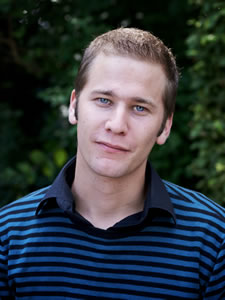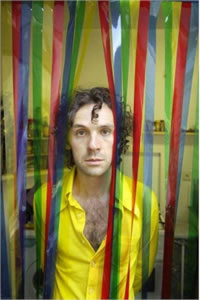De Nederlandse dichter, schrijver en letterkundige Wiel Kusters werd geboren in Spekholzerheide op 1 juni 1947. Zie ook alle tags voor Wiel Kusters op dit blog.
Vader Aarde, Moeder Wereld
Ik moet de wegen tonen die mijn vader liep,
maar ook de plaatsen die mijn moeder meed.
Die diepte waarin vader zich versliep
was voor mijn moeder eerder lang en breed:
de maten van haar waken in hun bed.
Haar wereld was niet groot, tien straten nauw.
De kleine dingen waar je dan op let.
Bewuste rondgang. God en wereld trouw.
De diepte en het oppervlak, het waken en de slaap.
De wouden van de droom, de perken van het licht.
Ik houd die twee maar moeilijk uit elkaar.
Maar nu ik hier mijn woorden samenraap,
ontbindt zich, vader, moeder, haast uw paar.
Kom toch te bed, en slaap en waak in dit gedicht.
Spreek
Spreek
als je kunt.
Drie vuurpotten in de open lucht,
als het ware in de lucht.
Even was ik bang.
Alles verdween voor mijn ogen
als een brandende grashelling.
Ik moest mijn handen warmen in een leeg hoofd…
Uit nacht en rook stegen maanschijven.
Daar liep je, ik dacht dat ik je hoorde huiveren.
Dat was de kunst.
Brief in een nachtkastje gevonden
Het was een zomerdag, een slap begin
voor een gedicht dat me verwonden wil.
Maar niets zo onbedaarlijk als de spin
die in haar web zit. Dus ik houd me stil.
Je kwam van ver, pas nu zie ik de draad
waarlangs je leven zich toen leiden liet
naar waar ik nooit meer op mezelf besta.
Onzichtbaar worden, nee, ik kon het niet.
Ik zou willen zeggen dat de aarde beefde,
de bomen schudden, struiken struikelden,
de hemel zon en maan tot botsen bracht,
dat onontwarbaar werden dag en nacht.
Dan kon ik menen dat ik huichelde
of vragen: ‘Weet je of ik toen nog leefde?
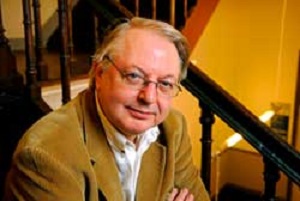
De Nederlandse dichter en essayist Arie van den Berg werd geboren in Alkmaar op 1 juni 1948. Zie ook alle tags voor Arie van den Berg op dit blog.
Want liefde
4.
want liefde is dingen, delen leren
in wat stil groeit, de beelden
van de ander willen zien
‘wat heeft een zwaan meer nodig dan
een zwaan,’ herkenning kiemt in eigen vijver
snel verwaterd: wat ik zag en
dacht werd weldra rimpel
op rimpeling weer uitgewist
alleen de namen bleven, overleefde
pijnen in een nieuw maar even dwingend lijf
dus mijd ik maar te noemen wat ik wil,
want wat ik zei en wilde miste
wortel, droeg nooit vrucht
ontrimpel dus schuchter je landschap, beducht
voor de minzame onmin met woorden
Drinklied
hoe kan wie zoals wij zijn klei
goed nat houdt prooi zijn van de wind?
hoe wie zo dronk en drinkt sleets stof
want knekels zijn, of as?
wie zich bedrinkt heeft slecht gedronken,
wie nooit iets dronk een dor bestaan –
de liefde dood? dan helpt jenever,
laat dus de dood zijn werk maar doen
drie meisjes gingen voor, drie volgden,
maar zij alleen bleef achter in elk glas;
geen spie meer in de beurs – gestolen drank
bleek even zoet, geduldig is de galg.
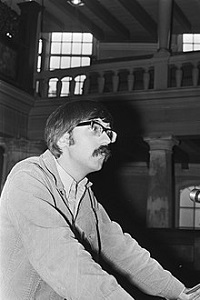
In 1970
De Franse schrijver en journalist Patrick Besson werd geboren op 1 juni 1956 in Montreuil. Zie ook alle tags voor Patrick Besson op dit blog.
Uit: Tout le pouvoir aux soviets
« Sonnerie. Ce n’est pas un réveil, mais une minuterie. Les trente minutes de la location de la chambre et de la prostituée sont écoulées. La Kazakh me demande, toujours par gestes, si je veux la prendre une demi-heure de plus, puisque je ne l’ai pas prise. Je réponds en russe : niet. Dehors, je me dirige vers la place des Théâtres qui fut le théâtre de la version moscovite d’octobre 17. J’entre dans un long restaurant bicolore – chaises blanches, tables noires – presque vide. L’effet des sanctions économiques de l’UE et des USA contre le botoxé Poutine, idole des expatriés français en Russie ? Ou d’une mauvaise cuisine ? Le maître d’hôtel est assorti au restaurant : son corps bien proportionné est moulé dans une robe blanche à pois noirs. C’est une grande brune de type asiatique, sans doute une Sibérienne. Les Sibériennes sont des Thaïs qui n’ont pas besoin de danser sur les tables, ayant des jambes. Avec elle, je ne me contenterai pas de parler mon russe littéraire : le déploierai comme un drapeau sexuel. Qu’y a-t-il de plus rapide qu’un financier ? Peut-être un footballeur. Une négociation est un soufflé au fromage : ne doit pas retomber.
Je fais ma première offre à la Sibérienne : un verre après son service. Tania – les femmes russes n’ont, depuis des siècles, qu’une dizaine de prénoms à leur disposition, c’est pourquoi Tania s’appelle comme ma défunte mère – ne sourit pas. Elle me regarde avec une insistance étonnée. Elle dit qu’elle n’a pas soif. A-t-elle sommeil ? Si oui, je l’emmène à mon hôtel. Il faut d’abord, me dit-elle, qu’elle appelle son mari pour obtenir son accord. Je lui dis que je peux l’appeler moi-même. Entre hommes cultivés, nous finirons par trouver un arrangement. Qu’est-ce qui me fait croire que son mari est cultivé ? demande-t-elle. Elle entre dans mon jeu, c’est bien : on progresse vers le lit. Je ne réponds pas car ce n’est pas une question, juste un revers lifté. Elle dit que, bien sûr, elle n’est pas mariée, sinon j’aurais déjà reçu une claque, bientôt suivie d’une balle dans la tête administrée par ledit époux. Je propose que nous allions nous promener autour de l’étang du Patriarche. »
Elle me demande si je suis romantique. Non : boulgakovien. Le numéro deux dans le cœur sec de maman, après Pouchkine.
– Votre mère était russe ? m’interroge la Sibérienne.
– Oui. Ça ne se voit pas ?
– Si.Moscou toujours un peu mouillée la nuit. Les voitures glissent sur l’immensité des rues. Il n’y a plus de tragédie socialiste dans l’air, rien que l’innocente recherche du sexe. Tania me prend le bras, comme une vieille amie.
– Allons dormir, je suis fatiguée. »

De Engelse dichter en schrijver John Edward Masefield werd geboren op 1 juni 1878 in Ledbury, in Herefordshire. Zie ook alle tags voor John Masefield op dit blog.
The Haunted (Fragment)
Here, in this darkened room of this old house,
I sit beside the fire. I hear again,
Within, the scutter where the mice carouse,
Without, the gutter dropping with the rain.
Opposite, are black shelves of wormy books,
To left, glazed cases, dusty with the same,
Behind, a wall, with rusty guns on hooks,
To right, the fire, that chokes one panting flame.
Over the mantel, black as funeral cloth,
A portrait hangs, a man, whose flesh the worm
Has mawed this hundred years, whose clothes the moth
A century since, has channelled to a term.
I cannot see his face : I only know
He stares at me, that man of long ago.
I light the candles in the long brass sticks,
I see him now, a pale-eyed, simpering man,
Framed in carved wood, wherein the death-watch ticks,
A most dead face : yet when the work began
That face, the pale puce coat, the simpering smile,
The hands that hold a book, the eyes that gaze,
Moved to the touch of mind a little while.
The painter sat in judgment on his ways :
The painter turned him to and from the light,
Talked about art, or bade him lift his head.
Judged the lips’ paleness and the temples’ white,
And now his work abides ; the man is dead.
But is he dead ? This dusty study drear
Creaks in its panels that the man is here.
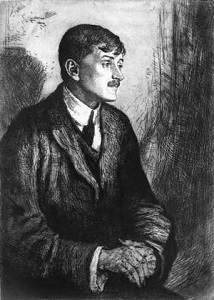
Portret door William Strang, 1912
De Oostenrijkse schrijver Ferdinand Raimund werd geboren op 1 juni 1790 in Wenen. Zie ook alle tags voor Ferdinand Raimund op dit blog.
Uit: Der Verschwender
„FRITZ. Ich kann mich ärgern, daß er so viel verspielt.
JOHANN. Warum denn? Er wills ja nicht anders. Die reichen Leute sollen die Langeweile bezahlen, die sie andern verursachen.
FRITZ Ah, über den gnädgen Herrn ist nichts zu sagen. Das ist ein wahrhaft nobler Mann. Er bewirtet nicht nur seine Freunde, er unterstützt die ganze Welt. Die Bauern, hör ich, zahlen ja fast niemals eine Abgabe.
JOHANN. Er hat mir nur zu heftige Leidenschaften. Wart, bis du ihn einmal in Wut erblickst. Da schont er weder sein noch eines andern Glück. Da kann alles zugrunde gehen.
FRITZ. Aber wenn er sich besinnt, ersetzt ers sicher dreifach wieder.
JOHANN. (achselzuckend). Ja! Wenns nur immer so fortgeht.
FRITZ. Wer ist denn der junge Mann, der gestern angekommen ist? Ein scharmanter Mensch.
JOHANN. Das weiß ich nicht. Das wird sich schon noch zeigen. Für mich gibt es nur zweierlei Menschen. Menschen, die Trinkgeld geben, und Menschen, die keines geben. Das bestimmt meine Dienstfertigkeit.
FRITZ. Ich finde, daß er sehr höflich ist.
JOHANN.. Da wird er vermutlich sehr wenig geben. Wer mich mit Höflichkeit beschenkt, macht mich melancholisch. Aber wenn mir einer so einen Dukaten hinwirft und zuruft: Schlingel, heb ihn auf! da denk ich mir: Ha! welch eine Lust ist es, ein Schlingel zu sein!“
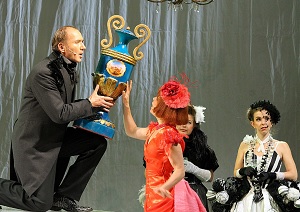
Scene uit een opvoering in Gutenstein, 2013
De Duitse schrijver, essayist, journalist, biograaf en uitgever Peter de Mendelssohn werd op 1 juni 1908 in München geboren. Zie ook alle tags voor Peter de Mendelssohn op dit blog.
Uit: Der Zauberer
„Aus dem ersten Teil vertraute Quellen versiegen; andere, neue öffnen sich. Für den ersten Teil standen, neben den längst bekannten autobiographischen Abrissen, vor allem Thomas Manns zum guten Teil noch unveröffentlichte Briefe, seine damals noch unerschlossenen Notizbücher und die Zettel-Konvolute seiner Vorarbeiten für die Hauptwerke als neue Hauptquellen zur Verfügung. Zwölf der insgesamt vierzehn erhaltenen Notizbücher sind in den ersten Teil der Schilderung eingegangen. Für die zweite Hälfte besitzen wir somit nur noch zwei Notizbücher aus späterer Zeit, die nicht sehr ergiebig sind, und danach keine mehr. Auch sind für die Hauptwerke hinfort, bis zur Joseph-Tetralogie, also vor allem für den Zauberberg, keine Vorarbeiten erhalten, auf welche die Schilderung sich stützen könnte. Wir wissen, daß sie existierten, aber sie sind verloren. Dafür ist für die zweite Lebenshälfte, neben der nun stetig anwachsenden Masse der Briefe, eine neue Auskunftsquelle zur Hand, welche für die erste nicht zur Verfügung stand: Thomas Manns Tagebücher. Freilich nicht durchlaufend für die ganze Spanne. Die Tagebücher seiner Jugendjahre, die mit den Notizbüchern parallel liefen, vernichtete Thomas Mann selbst im Jahr 1896 und schrieb darüber an Grautoff: »Übrigens: Ich habe es dieser Tage bei mir ganz besonders warm …«. Die Tagebücher der nachfolgenden Jahrzehnte bis zum Frühjahr 1933 warf er, wie wir ebenfalls von ihm selbst wissen, zumindest zum größten Teil ins Feuer. Am 20. Juni 1944 »begann« er »mit der Vernichtung alter Tagebücher« und am 21. Mai 1945 notierte er: »Danach alte Tagebücher vernichtet in Ausführung eines längst gehegten Vorsatzes. Verbrennung im Ofen draußen.« Die restlichen, aus den letzten zweiundzwanzig Lebensjahren, bewahrte er auf. Die Hefte aus der Zeit von 1933 bis 1951 verpackte und versiegelte er noch selbst, vor der Rückkehr aus Amerika nach Europa, und versah diese drei Pakete mit der eigenhändigen Aufschrift, sie enthielten tägliche Aufzeichnungen von 1933 bis 1951 >ohne literarischen Wert<, und der Weisung, die Pakete dürften erst zwanzig Jahre nach seinem Tod geöffnet werden. Aus den verbliebenen Tagebüchern seiner letzten Lebensjahre am Zürichsee machte er noch selbst ein Paket, gleich als habe er am 30. Juni 1955 seine Reise nach Holland, auf der er erkrankte, in dem Wissen angetreten, daß es die letzte sei und daß er von ihr in sein Haus in Kilchberg und an seinen Schreibtisch nicht zurückkehren werde. Seine Tochter Erika besorgte nach seinem Tod die Versiegelung dieses vierten Pakets und die entsprechende Aufschrift. Als diese vier Pakete an Thomas Manns zwanzigstem Todestag, dem 12. August 1975, geöffnet wurden, enthüllten sie eine Überraschung, auf die man nach den Aufschriften nicht gefaßt sein konnte. Die Pakete enthielten insgesamt zweiunddreißig Tagebuchhefte, aber nicht nur die verheißenen der letzten zwei Lebensjahrzehnte, die vom 15. März 1933 bis zum 29. Juli 1955 reichen, also bis zwei Wochen vor Thomas Manns Tod, sondern außerdem noch vier Hefte, die aus einer ganz anderen, viel früheren Zeit stammen und Aufzeichnungen vom 11. September 1918 bis zum 1. Dezember 1921 enthalten.“
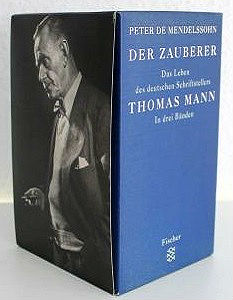
“Der Zauberer“- box
De Duitse schrijfster Petra Morsbach werd geboren op 1 juni 1956 in Zürich. Zie ook alle tags voor Petra Morsbach op dit blog.
Uit: Gottesdiener
„Die Empfehlung des Bischofs für solche Anwandlungen lautet, unauffällig auf die Bremse zu treten, denn einerseits soll der Fehlglaube eingeschränkt, andererseits die Volksfrömmigkeit nicht frustriert werden. Er dachte kurz nach und sag-te dann: Es sei spät, er sei müde, Weihnachten stehe bevor, danach könne man über Ostern reden. Pfüa Gott. Er verabschiedete sich von allen per Hand-schlag. Dann ging er zurück in die Sakristei und zog seine Albe aus, hängte sie zusammen mit der Stola in den Schrank, faltete das Schultertuch zusammen und gab es der Mesnerin, die es dankenswerterweise wa-schen wollte. Er schlüpfte in seine Wolljacke und lief über den Friedhof zum Pfarrhaus, dann die Treppe hinauf direkt in die Küche. Seit halb elf Uhr vormit-tags hatte er nichts gegessen, ein Termin nach dem anderen, nur vor der Messe war eine halbe Stunde Zeit gewesen, aber da beachtet er die eucharistische Nüchternheit. Jetzt holt er die Aldi-Weißwürste aus dem Kühlschrank, reißt zwei aus der Packung und ißt sie im Stehen. Dann kommt ihm das selbst übertrie-ben vor, und die anderen drei Würste erhitzt er, wäh-rend er in der Speisekammer nach süßem Senf sucht, den er nicht findet. Er ißt die heißen Würste ohne Senf, immerhin setzt er sich hin und schabt das Brät mit dem Messer aus der Haut Er trinkt Malzbier dazu. Sie sind gutwillige, ordentliche Leute, sagt er sich. Sie sind ihm gewogen und wünschen sein Wohlwollen. Sie würden ihn nie zu etwas zwingen wollen und könn-ten es auch nicht. Es war ein blöder Moment. Isidor ärgert sich nur über sich, nicht über sie, und um das zu beweisen, macht er sich sofort über alle die wohl-wollendsten Gedanken. Er wird ruhiger. Der Abend ist noch lang. Warum sollen sie nicht nach Konnersreuth fahren? überlegt er also. Das wird niemanden von ih-nen besser oder schlechter machen, aber vielleicht dem einen oder anderen Mut und Hoffnung geben, und die haben sie alle nötig. Er geht sie rasch in Gedanken durch — Frau Valin, Frau Zwickt., Herrn Pechl und so weiter, alles Leute, die sonst so gut wie nichts mitein-ander zu tun haben — was ist bloß in sie gefahren? Oder hat er etwas Wichtiges übersehen? Frau Valin zum Beispiel. Die hieß Willinger, bevor sie vor fünfzig Jahren einen Franzosen heiratete und nach Frankreich zog. Die Ehe scheiterte. Frau Valin ar-beitete in Rouen als Bardame, später als Putzfrau. Den Beruf wechselte sie, weil sie ihrem kleinen Sohn ein Vorbild sein wollte. Er war ein einsichtiger und ge-scheiter Bub, sie konnte ihn zur Arbeit mitnehmen, dort saß er auf dem Perserteppich der großbürger-lichen Wohnung und brachte sich selbst das Lesen bei. Madame und Monsieur, ein kinderloses Rechtsanwalts-ehepaar, waren schließlich so vernarrt in ihn, daß sie vorschlugen, ihn zu adoptieren.“
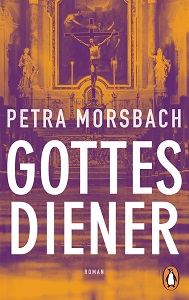
Cover
De Canadese dichter en schrijver William Wilfred Campbell werd geboren rond 1 juni 1858 in Berlin, Ontario, tegenwoordig Kitchener. Zie ook alle tags voor William Campbell op dit blog.
The Last Prayer
MASTER of life, the day is done;
My sun of life is sinking low;
I watch the hours slip one by one
And hark the night-wind and the snow.
And must Thou shut the morning out,
And dim the eye that loved to see;
Silence the melody and rout,
And seal the joys of earth for me?
And must Thou banish all the hope,
The large horizon’s eagle-swim,
The splendour of the far-off slope
That ran about the world’s great rim,
That rose with morning’s crimson rays
And grew to noonday’s gloried dome,
Melting to even’s purple haze
When all the hopes of earth went home?
Yea, Master of this ruined house,
The mortgage closed, outruns the lease;
Long since is hushed the gay carouse,
And now the windowed lights must cease.
The doors all barred, the shutters up,
Dismantled, empty, wall and floor,
And now for one grim eve to sup
With Death, the bailiff, at the door.
Yea, I will take the gloomward road
Where fast the Arctic nights set in,
To reach the bourne of that abode
Which Thou hast kept for all my kin.
And all life’s splendid joys forego,
Walled in with night and senseless stone,
If at the last my heart might know
Through all the dark one joy alone.
Yea, Thou mayst quench the latest spark
Of life’s weird day’s expectancy,
Roll down the thunders of the dark
And close the light of life for me;
Melt all the splendid blue above
And let these magic wonders die,
If Thou wilt only leave me, Love,
And Love’s heart-brother, Memory.
Though all the hopes of every race
Crumbled in one red crucible,
And melted, mingled into space,
Yet, Master, Thou wert merciful.
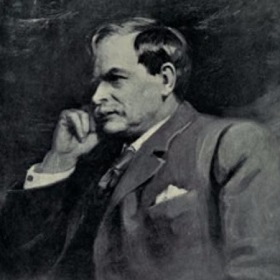
De Argentijnse schrijver Macedonio Fernández werd geboren op 1 juni 1874 in Buenos Aires. Zie ook alle tags voor Macedonio Fernández op dit blog.
Uit: From The Museum of Eterna’s Novel (Vertaald door Margaret Schwartz)
“This is the only novel that tells everything and that,
nevertheless, has nothing added, although the obligation to tell
everything leads to telling more. I got hung up reading Arabic stories
in my adolescence, because I didn’t know there were only 1001, so I kept
reading them after I’d finished: I was warned much too late, and so I
continued devouring stories, which I found abundantly scattered through
Morality, History; there are stories of Progress, the abnegation of
statesmen or martyrs or propagandists of some selfless cause, like the
happiness of the good, repentance of evil, the ultimate concordance of
the general and the particular, or Utilitarianism, the order of the
Universe and other miracles of the abundant “faith” of the men of
science, which is so demanding of vulgar miracles!
* * *
This is a novel with two beginnings, according to preference.
It has a lot of sadness and a lot of enthusiasm, but no death, only the words The End, written a long time off, much after you have finished reading the title. It’s only written once, although the prologues need it (not all of them, but a few need endings), and even the title, when it ends: I’ve abolished The End of the title, The End of the prologue, so as to show just how little the novel depends on death for its existence—but neither does it rely on life (truth, realism)—.
It has two almost-impossibilities that are almost resolved: how to narrate the ultimate and what to do with a bungled joke—how to regain one’s composure after having laughed at a tragedy because the title gave no indication that it was not comedy.
It interrupts its reading and narration once, so that Sweetheart can get dressed, during which the reader should have no pretext to read, as that’s his way of looking.
It has twenty-nine prologues written to prevent it from beginning.
It has the exclusive use of three new mathematical tenses. These are “novel tenses” which have never, before today, been spooled out in narratives and novels, as if time didn’t flee and flow during events of fantasy”.
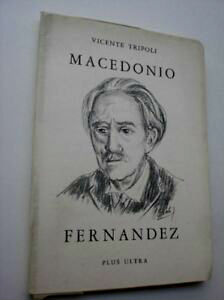
Cover
Zie voor nog meer schrijvers van de 1e juni ook mijn blog van 1 juni 2018.

